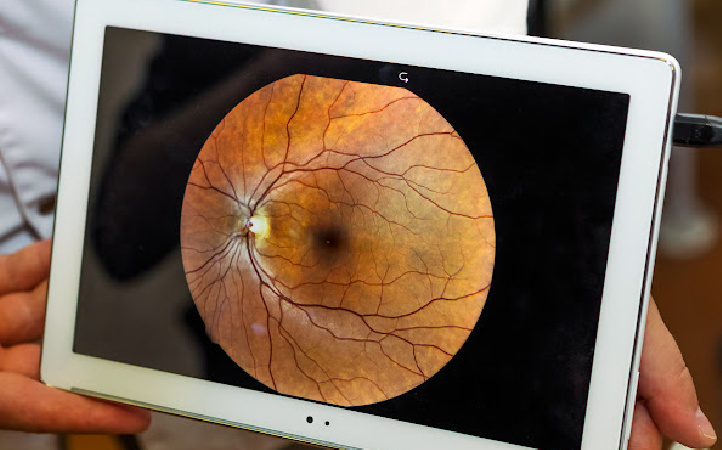Macular Degeneration Treatment The Villages
Having issues seeing near or far?
Ram Eye Care offers macular degeneration treatment in The Villages, Florida and throughout Central Florida. Macular degeneration most often occurs after the age of 60 and is an eye disease that causes vision loss. While having issues seeing near or far doesn’t mean you have macular degeneration, your sight is too important to ignore these signs without having your eyes examined. Ram Eye Care and Retina Center has been offering treatments for macular degeneration as well as an array of eye care and retina services to families in The Villages Florida since 1997. For peace of mind, Ram Eye Care offers complete comprehensive eye exams for the whole family. At Ram Eye Care and Retina Center, Saving your Site is Our Passion. With two offices to serve you, we are equipped with premier state of the art equipment to diagnose and treat your conditions. Call or contact us today to arrange for you eye examination.

What is Macular Degeneration?
Macular Degeneration is an age-related condition when the most sensitive part of the retina, called the macula, starts to break down and lose the ability to create clear visual images. It is also referred to as, Age Related Macular Degeneration, (AMD), or (ARMD). The macula is located in the back of the eye and controls your central vision. It does not affect peripheral vision. It is critical in assisting a person with activities such as reading, driving, and facial recognition. When the macula starts to deteriorate or break down it causes the patient to lose the ability to see clear visual images. It is the leading cause of blindness in Americans over the age of 65. Macular Degeneration may affect just one eye and because it is a slow process it can be very hard to detect. However, when both eyes are affected, vision loss may be much more pronounced and occur more quickly.
Can treatments slow the advance of macular degeneration?
Yes, while at this time there is no cure for macular degeneration, treatments such as medications and laser therapy can help stop the leaking that leads to macular degeneration.
Macular Degeneration
What are the Symptoms of Macular Degeneration?
In most cases of Macular Degeneration, the process leads to a slow loss of vision and the patient will not experience any pain or discomfort. Because it is normally a slow process, it’s important that patients, especially those who are older, receive regular retinal examinations. With regularly scheduled exams, the disease can often be detected in it’s early stages, even before symptoms occur.
The symptoms of Macular Degeneration include:
- A reduced ability to see near or far
- Blurriness
- Dark or shadowy areas seen within your central field of vision
- Distorted vision
- Difficulty in reading small print
- Straight lines may appear distorted
Types of Macular Degeneration
Dry AMD
Wet AMD
Who is at a Higher Risk of Contracting Macular Degeneration?
The most common at-risk individuals are those of older age. There is some evidence that would support a gene deficiency could be associated with up to half of all cases that lead to blindness. While older individuals are clearly most susceptible, Caucasians and females are particularly affected. There is growing evidence that smokers are at a much higher risk, as well as people with high blood pressure, are obese, experience over exposure to sunlight and who have high fat diets. The disease may also be caused as a side effect of some drugs.
Treatment Options
Unfortunately, while there are no approved treatments for Dry AMD, early detection can make it manageable. While some drugs are currently in clinical trials, the best treatment is a regular schedule of retina exams to insure early detection. There is some evidence to support that certain vitamins and multivitamins can be used to treat the condition. Vitamin C, vitamin E, Lutein, Zeaxanthin, Zinc Oxide, And Cupric Oxide, (Copper), have been shown to assist in slowing the degeneration of the macula. Adjusting diets to include thicker leafy greens such as spinach also can be helpful.
There are three available treatments for Wet AMD
Anti-VEGF Treatment
Thermal Laser Treatments
Photodynamic Therapy
A Few Words From Our Customers
![]()
First time at RAM will NOT be my last. I cannot say enough great things about RAM Eye Care from all staff to Dr. Ramchander who has such an expertise of the eyes but also exudes a nice personality and professionalism. He truly cares about you and the health of your eyes. Very thorough
Why Choose Ram Eye Care and Retina Center
Dr. Ramchander and his staff are ready to provide a level of personal care that you will find unique and refreshing. At Ram Eye Care and Retina Center, we take a personal approach to every patient’s condition, and you will be completely informed throughout your treatment. Call or contact Ram Eye Care and Retina Center today, at either of our convenient locations in The Villages or Leesburg, to schedule your appointment with Dr. Ramchander.
Ram Eye Care and Retina Center Proudly Offers Services to the Communities in
The Villages, Leesburg, Lady Lake, Fruitland Park, Tavares, Eustis, Mount Dora, Umatilla, Howey-in-the-Hills, Wildwood, Bushnell, Belleview
